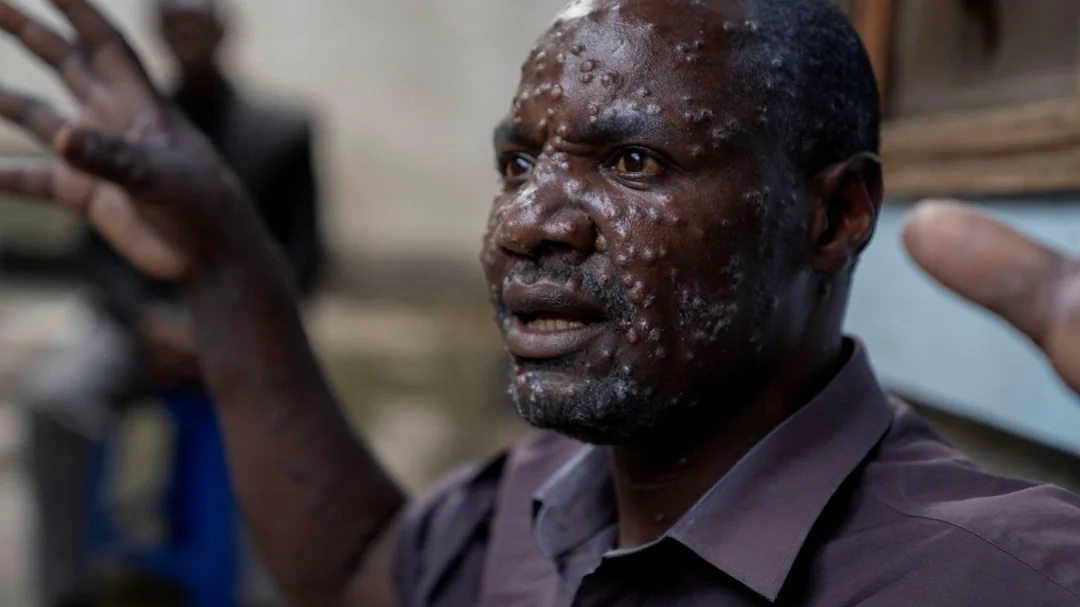Mpox, formerly referred to as Monkeypox, is a zoonotic virus, meaning it can be transmitted from animals to humans. This virus, closely related to smallpox, belongs to the Orthopoxvirus genus. Once considered a rare and isolated disease confined to remote regions of Central and West Africa, Mpox has now evolved into a significant public health concern. As it spreads across the African continent, understanding its origins, transmission, and symptoms becomes critical.
What is Mpox?
Mpox is a viral disease that is relatively rare but highly contagious. It is caused by the Monkeypox virus and presents with symptoms similar to smallpox, though generally less severe. The disease has gained more attention recently due to a noticeable increase in cases, signaling that it may no longer be confined to its traditional endemic regions.
Mpox can be transmitted in several ways, primarily through direct contact with the bodily fluids, lesions, or respiratory droplets of an infected person. This makes close physical contact, especially in household or healthcare settings, a significant risk factor. Additionally, the virus can spread through contact with contaminated objects like bedding or clothing.
One of the most common ways Mpox spreads is through direct physical contact with an infected person. This includes exposure to bodily fluids, lesions, or respiratory droplets, which can easily transfer the virus. This type of transmission is particularly prevalent in settings where close contact is unavoidable, such as households and healthcare facilities.
Another critical transmission route for Mpox is animal-to-human transmission. This typically occurs through bites or scratches from infected animals or by handling bushmeat. In regions where bushmeat is a common food source, this method of transmission poses a significant risk. Rodents and primates, known carriers of the virus, are often the culprits in these cases.
The symptoms of Mpox are varied and can be quite severe. Initial signs include fever, headache, muscle aches, and swollen lymph nodes. This is often followed by a distinctive rash that progresses to painful, pus-filled lesions. These symptoms can persist for two to four weeks, with some cases leading to severe complications such as pneumonia or, in rare instances, death. Given the current rise in cases, the urgency for public health interventions is paramount.
The Rise of Mpox Cases in Africa
In recent months, the number of Mpox cases across Africa has seen a dramatic increase. This surge in infections has raised alarms across the continent, prompting governments and health organizations to take immediate action.
Statistics show a sharp rise in confirmed Mpox cases, particularly in countries such as Nigeria, the Democratic Republic of Congo, and Cameroon. These nations have reported a doubling of cases in a short period, signaling a severe public health crisis. The World Health Organization (WHO) has expressed significant concern about this trend, urging global and regional collaboration to address the outbreak.
Several factors contribute to the rapid increase in Mpox cases in Africa. Understanding these factors is essential in formulating effective strategies to curb the spread.
One of the main drivers of the Mpox surge is rapid urbanization in many African countries. As cities expand and populations grow denser, the risk of disease transmission increases. Overcrowded urban areas often lack proper sanitation and healthcare facilities, making it easier for contagious diseases like Mpox to spread unchecked.
Many African nations are struggling with already overburdened healthcare systems. The sudden influx of Mpox cases has overwhelmed these systems, leading to delays in diagnosis, treatment, and containment efforts. The existing healthcare challenges, including the ongoing battle with diseases like malaria and HIV/AIDS, further complicate the response to the Mpox outbreak.
Climate change is another significant factor contributing to the spread of Mpox. Changes in weather patterns have altered animal habitats, increasing the likelihood of human-animal interactions that can lead to zoonotic diseases. Deforestation and environmental degradation have also disrupted ecosystems, bringing humans into closer contact with wildlife, thus facilitating the transmission of viruses like Mpox.
Africa’s Response to the Mpox Crisis
In response to the escalating Mpox crisis, several African governments have declared a health state of emergency. This move is a clear indication of the severity of the situation and the urgent need for coordinated action.
Declaring a health state of emergency is a critical step that allows governments to mobilize resources more effectively. It also signals a call for international support and highlights the dire need for immediate interventions to control the spread of the virus.
African governments are implementing various measures to tackle the Mpox outbreak. These measures include strict quarantine and isolation protocols, public awareness campaigns, and enhanced surveillance and reporting systems.
Quarantine and isolation have become key strategies in containing the Mpox outbreak. Governments have established protocols to ensure that infected individuals are isolated from the general population, reducing the risk of further transmission. While these measures are crucial, they also present challenges, such as ensuring compliance and providing adequate care for those in isolation.
Public education is a vital component of the response to Mpox. Governments, in collaboration with health organizations, are launching extensive campaigns to educate the public about the virus, its symptoms, and preventive measures. These campaigns are essential in curbing misinformation and encouraging communities to participate in prevention efforts actively.
The fight against Mpox in Africa requires international collaboration. Organizations like the WHO, the African Union, and various non-governmental organizations are providing much-needed support. This includes funding, expertise, and the provision of vaccines and medical supplies. Collaborative efforts are also focusing on research to better understand the virus and develop more effective treatment options.
The Mpox outbreak is not just a health crisis; it is a human crisis affecting millions of lives across Africa. The impact of the outbreak extends beyond the physical health of individuals, touching every aspect of life in the affected regions.
The economic impact of the Mpox outbreak is profound. With large numbers of people falling ill, productivity has decreased significantly. Markets, particularly those dealing in livestock and bushmeat, have been severely disrupted. In rural areas, where agriculture is the mainstay of the economy, the effects are even more pronounced, with farmers unable to work or sell their produce. This economic downturn is pushing many communities into deeper poverty, making recovery even more difficult.
The psychological toll of the Mpox outbreak is equally concerning. Fear and anxiety are pervasive, particularly in communities with high infection rates. The stigma associated with the disease is also a significant issue, leading to discrimination and social isolation of those affected. This social fallout is creating deep rifts within communities, undermining social cohesion and support systems.
Moving Forward: Mitigating the Spread of Mpox
To address the Mpox crisis effectively, a multi-faceted approach is necessary. This includes strengthening healthcare systems, improving vaccination and treatment options, and fostering community engagement.
Strengthening healthcare infrastructure is critical to managing the current Mpox outbreak and preventing future ones. This involves improving diagnostic capabilities, ensuring a steady supply of medical resources, and training healthcare workers to respond effectively to the crisis.
Vaccination is one of the most effective tools in the fight against Mpox. While smallpox vaccines offer some protection, the development of a specific Mpox vaccine is urgently needed. In the meantime, treatment focuses on managing symptoms and preventing complications. Ongoing research and international cooperation are essential to accelerating the development of better vaccines and treatments.
Engaging communities in the fight against Mpox is crucial. This involves not just educating people about the virus but also empowering them to take an active role in prevention and control efforts. Building community resilience through education, support systems, and strong local leadership can significantly impact how effectively the virus is contained. Informed, prepared, and supported communities are better equipped to handle the challenges posed by the Mpox outbreak.
The declaration of a health state of emergency in Africa due to rising Mpox cases marks a critical juncture in the fight against this rapidly spreading virus. The continent faces a daunting challenge, but with coordinated efforts, both locally and internationally, there is hope that the spread of Mpox can be contained. Strengthening healthcare systems, improving vaccination and treatment strategies, and fostering community resilience are essential steps in moving forward. The human impact of this crisis cannot be understated, and every effort must be made to mitigate the suffering and restore stability to the affected communities.

